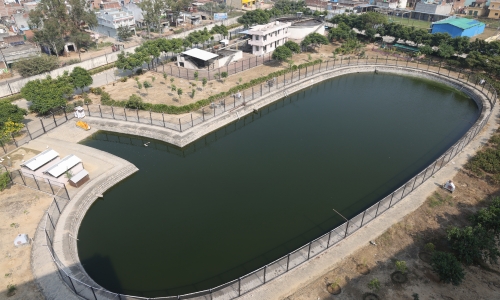
6.3.1 Wastewater Treatment
Teerthanker Mahaveer University (TMU) operates its
own Sewage Treatment Plant (STP) and Effluent Treatment Plant (ETP) to responsibly treat wastewater.
These facilities ensure that wastewater is processed safely and reused without causing environmental
harm. Treated water is used for non-potable purposes such as landscaping and irrigation, conserving
freshwater, and enriching soil. Through this practice, TMU reduces water stress, promotes conservation,
and supports an eco-friendly and sustainable campus.
The University strictly complies with environmental norms as per the guidelines to ensure system
efficiency. Green technologies and water-efficient systems further reduce energy use and carbon
emissions. TMU also strengthens sustainability by promoting research, innovation, and awareness programs
on water conservation and responsible wastewater management, demonstrating its commitment to
environmental stewardship and community well-being.
To further minimize dependence on the main supply and conserve natural resources, TMU has implemented large water tanks utilized for domestic needs, fire safety, and irrigation of agricultural fields. Rainwater from building rooftops and campus infrastructure is harvested via drains and permeates the landscape to replenish the groundwater table, substantially reducing external water extraction.
Teerthanker Mahaveer University (TMU) demonstrates exemplary commitment to sustainable water management, a crucial metric under Goals. The University’s total daily water consumption reaches approximately 13,35,000 liters. This volume caters to the needs of its campus blocks (6,75,000 liters), hospital (4,50,000 liters), and visitors (2,10,000 liters). Water is sourced through an integrated approach rainwater harvesting, groundwater recharge, and direct extraction from TMU’s own 10-Million-liter-capacity lake, which serves as a principal reservoir for rainwater collection and storage throughout the year.
Eighty percent of TMU’s supplied water (10,68,000 liters/day) is recycled via a 1.5 MLD Sewage Treatment Plant (STP). The treated water supports campus horticulture (6,00,000 liters/day) and agriculture (4,00,000 liters/day), while a variable balance is managed via the central reservoir, maintaining alignment with weather patterns and usage.
Additionally, TMU complies rigorously with guidelines for safe procurement, use, and disposal of chemicals and hazardous materials, featuring facilities such as the Effluent Treatment Plant (ETP, 200 KLD capacity). Dedicated maintenance ensures optimal water distribution throughout campus.
Through a synergy of harvesting, recycling, and responsible monitoring, TMU ensures its water requirements are met with minimal environmental impact, reflecting global best practices and fulfilling the standards for sustainable institutional operations.





